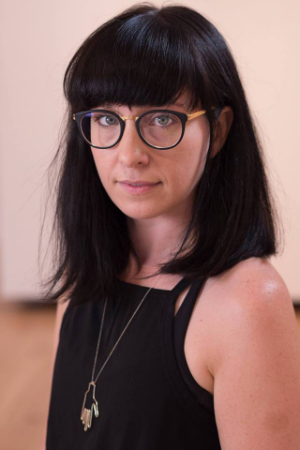Jenna Faye Powell

In what way did your experience at The Department of Visual Arts at Western impact you & your career path?
It wasn’t until I came back to London did I realize the impact the faculty and instructors had on my practice. Returning after my MFA at NSCADU, I began working at the regional Artist-Run Centre, Forest City Gallery (FCG). I turned to the professors and instructors who mentored me at Western, for input and aid in navigating the job and the community. The people, whom I greatly admired as instructors in my undergrad, were equally as generous with their time and input, assisting me in this new role. I’m lucky to call many of those people peers and friends now.
How have you been contributing to your community following your experience at Western?
My position at FCG is centered on community – London and the wider Canadian art public. Community isn’t just as group of people, but an active thing, with changing demands and challenges. What works one year may not the following year. What is needed from a community organization shifts based on its audience, and our public changes yearly with a primarily student-based audience at Fanshawe, Beal, and Western. FCG’s mandate is to assist emerging artists in whatever capacity we can – whether that be through exhibitions, lectures, professionalization workshops, drop-ins, studio space, etc – we do our best to adapt to the changing needs of these young artists.
Can you think back and share a memorable moment from your time here at Visual Arts?
A lot of my memories are people-based. Some of my favorites are of my last year in the BFA program, in the Practicum studios. The small group of us would gather after our respective days – in studio, writing essays, classes, etc. – and play Catch Phrase. For some reason playing this word game was the most cathartic, enjoyable thing to do after long days of painting, drawing, or whatever. We laughed a lot. I also have good memories of Sky Glabush’s painting classes. And Kirsty Robertson’s lectures, and general conversations with David Merritt.
What was the most important thing you learned during your time here?
I learnt the importance of volunteering and showing up. Although I didn’t quite understand the impact of this until 4th year, I still feel like this was the most valuable lesson - especially if I wanted to continue working in the arts outside of an academic institution. It’s a small Canadian art community, and you have to support each other. Also: I was recently in my studio researching something, and I thought “I wish someone knowledgeable on this particular topic would instruct me in how to research this, and steer me in the right direction. And I wish there were like-minded people around me that I could talk to about it” – and I realized I was describing school. I miss class and having someone share their years of researched knowledge with me.
What is something you are passionate about?
What are you working on right now? I’ve managed to find an adequate balance between my job at the gallery and working on my own practice. Maintaining this footing has been tricky, but continuing my own work is just as important to me as FCG. I have a few shows and 4-week residency coming up this year – I find having these goals/exhibitions on the horizon keeps me working in the studio, even when I’m drained. Also, I care a lot about London, and it’s art community, which I mentioned before is a part of my job, but has also become very much engrained in me. I have a lot of pride in FCG and London. I try, when I can, to volunteer for other festivals, events, and shows. I’m lucky to have pretty incredible friends who’ve helped shape and maintain the music and arts scene in London – I do my best to be there when they need an extra set of hands.
Why do you think a career in the Visual Arts is important/valuable?
This is a tough one to answer, as I think many people reading this already know how valuable the arts are to a city’s vitality, economy, and history. Not too much to an individual’s well being. I don’t think working in the visual arts needs to be justified by a statistic or dollar amount, like it’s something that needs to be defended as a ‘viable choice’. There is an overwhelming amount of pride and gratification in working with like-minded people in this industry. I love my job: it’s challenging and precarious, and is certainly more rewarding than other opportunities that have come my way.
What would your hopes be for the next 50 years of Visual Arts at Western?
I hope that Western’s visual arts program will be valued equally within the larger Western campus. And that this value would be displayed through increased engagement and financial support. Within the program, I’d love to see multi-disciplinary programs offered, like art-therapy and other cross-pollinating across programs and subjects.






